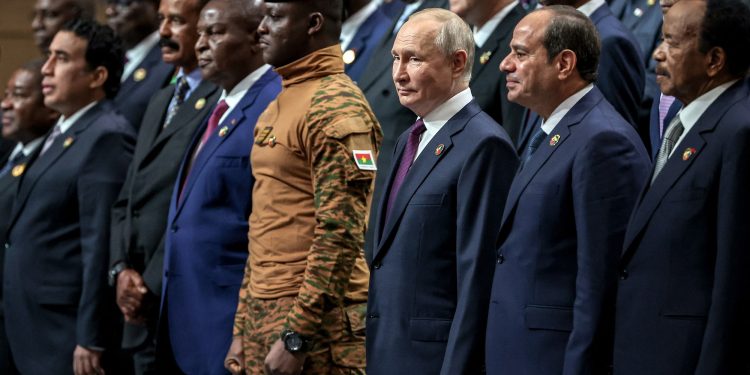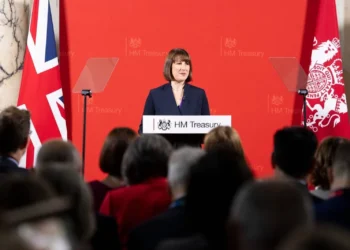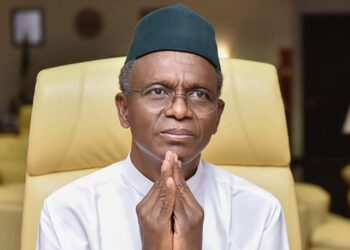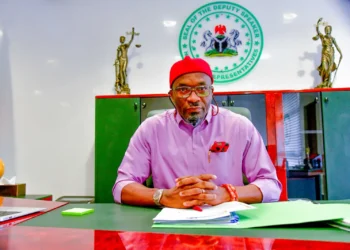In recent years, Russia’s expanding presence in Africa has raised alarm bells across the international community. The United States, United Kingdom, France, and other Western powers must recognize the urgency of addressing Russia’s manoeuvres on the African continent.
As Moscow deepens its engagement and geopolitical influence, there are clear instances of detrimental consequences for African nations, compelling the West to confront Russia now.
The Gravity of the Situation: The urgency of confronting Russia’s actions in Africa cannot be understated. While some may view Africa as a peripheral battleground for global powers, Russia’s ambitions are anything but insignificant.
The strategic positioning of military bases, lucrative arms deals, establishing and cozying up to authoritarian regimes in Africa pose a serious challenge to democratic governance and regional stability.
From pretentious moves posed as transactional, Putin’s Russia has now thrown off the gloves and is now punching directly and harder where it pains the region the most. The fight is not exactly with Africa, but with the West. Notwithstanding, Africa is the battleground, and Africans are the victims.
Instances of Disruptive Conduct: One striking example is Russia’s involvement in the Central African Republic (CAR). Moscow’s support for armed groups and paramilitary forces undermines CAR’s delicate security landscape, prolonging conflict and human suffering.
Additionally, Russian private military contractors have been implicated in human rights abuses, further destabilizing the region. The role of the Wagner Group in the Central African Republic and other African countries has been all destabilising for the continent.
In Sudan, Russia’s partnership with the government led by Omar al-Bashir enabled the regime’s violent crackdown on dissent. The consequences of this alliance continue to reverberate, even as Sudan grapples with its transition to democracy.
The Wagner Group’s presence in Mali has raised concerns about the fragile security situation in the region. As a private military company with strong ties to the Russian government, the Wagner Group’s involvement in Mali has exacerbated the ongoing conflict, undermining efforts for peace and stability.
Reports suggest that the group has supported various armed factions, exacerbating the violence that has plagued Mali for years. This involvement not only fuels the cycle of conflict but also impedes diplomatic initiatives aimed at resolving the crisis.
Additionally, accusations of human rights abuses linked to the Wagner Group further tarnish its reputation, deepening the suffering of the local population. The situation highlights the need for a comprehensive international response to curb the negative impact of private military contractors on the region’s security and stability.
In Burkina Faso, the Wagner Group’s presence has intensified an already dire security situation. The country faces a complex web of insurgent activities and armed groups, and the involvement of a private military company further complicates efforts to address these challenges.
There are allegations that the Wagner Group has provided support to certain factions, potentially prolonging conflict and exacerbating humanitarian crises. The presence of such a group not only undermines the government’s efforts to restore stability but also deepens the insecurity felt by civilians who bear the brunt of violence.
To achieve lasting peace, Burkina Faso and its international partners must address the detrimental role played by private military contractors like the Wagner Group and prioritize strategies that prioritize the well-being of the population and the country’s long-term stability.
What the West Must do Urgently: The consequences of inaction are too dire to ignore. Left unchecked, Russia’s manoeuvres could spark proxy conflicts, exacerbate internal divisions, and undermine diplomatic efforts.
By confronting Russia’s ambitions now, the United States, United Kingdom France, and Western powers can safeguard Africa’s security, democracy, and sovereignty.
A Call for Unified Response: As African nations strive for development and stability, it is imperative that the United States, France, and the West unite to counter Russia’s disruptive actions. This is not just a battle for regional influence; it is a struggle to uphold democratic values, human rights, and the well-being of African citizens. In the words of European Union High Representative Josep Borrell, “We cannot let others shape the future of Africa.”
Consequences of inaction or delayed action could be bad even for the West: The above instances highlight the insidious nature of Russia’s actions, which run contrary to the aspirations of peace, development, and democracy in Africa.
A destabilised Africa hurts the West more than Russia. Africans does not look at Russia for anything. They will always look at the West, which must absorb immigrants from Africa fleeing the hardship and the security risk from actions of Russia.
Former U.S. National Security Advisor, John Bolton, stressed the gravity of Russia’s encroachment in Africa, stating, “We must recognize the long-term risks of allowing Russian interference to flourish unchecked.”
Similarly, French President Emmanuel Macron warned, “Russia’s involvement in African conflicts could destabilize the entire region.” This destabilisation is already here. It is happening.
The urgency to confront Russia’s growing influence in Africa stems from the imperative to safeguard the continent’s stability and prosperity. Instances of Russia’s destabilizing activities are evident, and prominent leaders and experts echo the need for immediate action.
By acting decisively, the United States, France, and the Western world can prevent a further deterioration of Africa’s security landscape, ensuring a future of peace, progress, and democratic governance.












